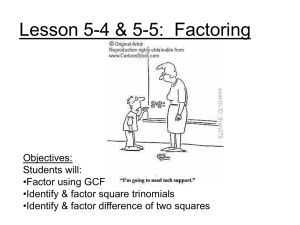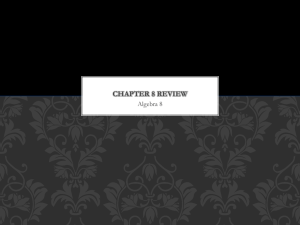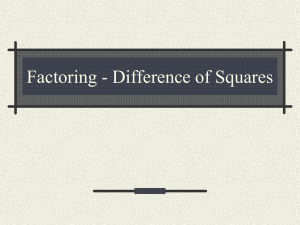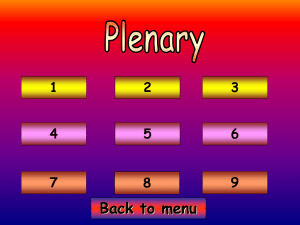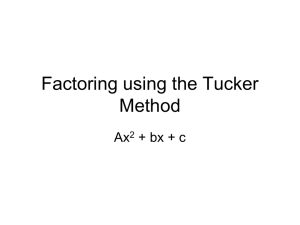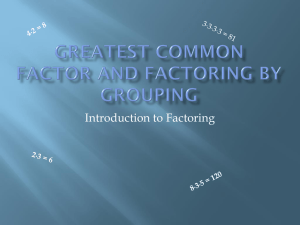Rules of factoring polynomials Flow Chart
advertisement
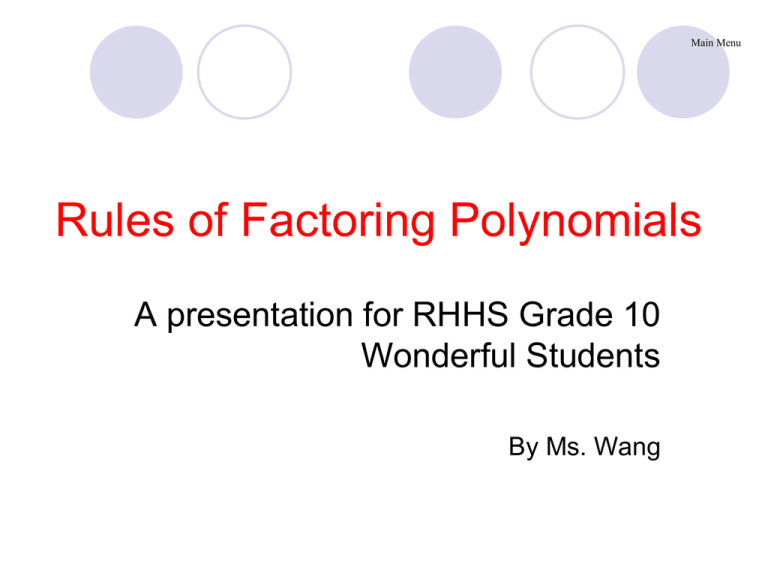
Main Menu Rules of Factoring Polynomials A presentation for RHHS Grade 10 Wonderful Students By Ms. Wang Main Menu Main Menu Rules Step by Step Easy Problems x 2 14x 24 3 2 3x 9 x 2 4s 16 Hard Problems 6 x3 15x 2 9 x 8 2 x 32 Medium Problems 4my 20m 3 py 15p 8s 2 200t 2 6 y2 5y 6 Word Problems Division of polynomial by monomial Find dimensions when area is given Main Menu Rules of Factoring Flowchart of Factoring polynomials GCF and Leading “-” Factor out GCF and rewrite the left polynomial inside a parenthesis Binomial a b 2 2 Difference of two squares (a b)(a b) Trinomial ax b cx d XBOX (ax b)(cx d ) Main Menu Step by Step Is there a GCF? Yes Factor as the product of the GCF and one other factor—i.e. GCF•(the other factor). Look at the other factor and go to the next step below with it. No Go the the next step. Is it a binomial? Yes Is it a difference of two squares? (a2-b2) • Yes—Factor as (a+b)(a-b). • No—It can’t be factored any more. No Go to the next step. Main Menu Main Menu Is it a trinomial? Yes Use the X BOX pattern to look for factors. No Go to the next step. Main Menu NOTE: At EVERY step along the way, you must look at the factors that you get to see if they can be factored any more. Factoring completely means that no factors can be broken down any further using any of the rules you’ve learned. Main Menu Practice Factor completely. x 14x 24 2 No. Is there a GCF? Is it a binomial or trinomial? It’s a trinomial. XBOX Main Menu x2 24 x 12 x 2 Use your handy-dandy calculator or your super math skills to find 12 and 2 as the factors to use. 12x + 2x = 14x Rewrite the equation with those two factors in the middle. x 14x 24 2 ( x 12)(x 2) Write the two factors. Neither one of these factors can be broken down any more, so you’re done. Main Menu Factor completely 3x 9 x 3 2 Is there a GCF? Yes. Write the GCF first and the remaining factor after it. 3x ( x 3) 2 Look at the remaining factor. (x-3) Is it a binomial or trinomial? It’s a binomial. Is it a difference of two squares? (a2-b2) No. You can’t do anything else. 3x ( x 3) 2 is the completely factored form. Main Menu Factor completely 4s 16 2 Is there a GCF? Yes. Write the GCF first and the remaining factor after it. 4(s 4) Look at the remaining factor. (s -4) 2 2 Is it a binomial, trinomial? It’s a binomial. Is it a difference of two squares? (a2-b2) Yes. s2 is a square (s • s) and 4 is a square (2 • 2). Factor as (s+2)(s-2). Then write the complete factorization. 4( s 2)(s 2) Main Menu Factor completely 6y 5y 6 2 No. Is there a GCF? Is it a binomial or trinomial? It’s a trinomial. 6y2 2y b -3 3y 2 Main Menu Check the sum of the cross product is -5y 2*2y + 3y *(-3) = -5y Rewrite the equation with those two factors in the middle. 6y 5y 6 2 (2 y 3)(3 y 2) Write the two factors. Main Menu Factor completely 6 x 15x 9 x 3 2 Is there a GCF? Yes. Write the GCF first and the remaining factor after it. 3x(2x 5x 3) Look at the remaining factor. 2 (2x2 5x 3) Is it a binomial or trinomial? It’s a trinomial. 2x2 2x x -3 -1 3 Main Menu Check the sum of the cross product is 5x. 2x*3 + x*(-1) =5x Rewrite the equation with those two factors in the middle. 3x(2 x 5x 3) 2 3x( x 3)(2 x 1) Write all three factors. Main Menu Factor completely 2 x 32 8 Is there a GCF? Yes. Write the GCF first and the remaining factor after it. 2( x 16) 8 Look at the remaining factor. ( x8 16) Is it a binomial, trinomial, or four-term polynomial? It’s a binomial. Is it a difference of two squares? (a2-b2) Yes. x8 is a square (x4 • x4) and 16 is a square (4 • 4). Factor as (x4 + 4)(x4 - 4). So far we have 2(x4 + 4)(x4 - 4). (Please continue—not done yet!!) Main Menu 2(x4 +4)(x4 -4) Look at what you have. Can either of the binomials be broken down? (x4 +4) Is this binomial a difference of two squares? (a2-b2) No. It can’t be broken down. So, we have to keep this factor. What about the other binomial? (x4 -4) Is this binomial a difference of two squares? (a2-b2) Yes. x4 is a square (x2 • x2) and 4 is a square (2 • 2). Factor as (x2 + 2)(x2 - 2). Main Menu Put it all together. 2 x 32 8 2( x 16) 8 =2(x4 +4)(x4 -4) =2(x4 +4)(x2 +2)(x2 -2) Not a difference of squares. Can’t go any farther!! Main Menu Word Problem #1 What is the quotient when 12x3 8x 2 16x is divided by 4x? This question is 3 2 3 2 12 x 8 x 16 x 12 x 8 x 16x asking you to find 4x 4x 4x 4x the OTHER FACTOR after you take out the greatest 2 3x 2x 4 common factor of 4x. Simplify each term. 3x 2 x 4 2 Main Menu Word Problem #2 A rectangular garden plot has an area represented by the expression 18x 2 3x 28 Find the dimensions of the garden plot. This is a factoring problem. You need to find the two factors that multiply together to give you 18x 2 3x 28 Main Menu 18x 3x 28 2 No. Is there a GCF? Is it a binomial, trinomial, or four-term polynomial? It’s a trinomial. 18x2 3x 6x -28 -4 7 Main Menu Check the sum of the cross product of the XBOX is -3x. Rewrite the equation with those two factors in the middle. 18x 3x 28 2 (3x 4)(6 x 7) Write the two factors. Length is 3x - 4 and width is 6x + 7 Main Menu The End Practice Makes Master!
